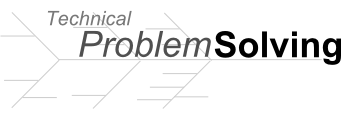This brings me back to diverse thinking and confirmation bias. The longer we work on a problem, the more focused we are. The good part is that we tune out the unimportant and distractions, but the downside is that we are less open to a new insight which might lead to a better solution.
How does one achieve a balance between focus and freshness? One way is to have several projects going at once (who doesn't) but rather than flitting back-and-forth in a feeble attempt to multi-task, I think you should dedicate significant chunks of time and effort to one problem. Then switch to another without re-visiting the first problem for some time. When you return to the initial problem you can't help but have a fresh perspective. You've also allowed for some incubation to occur. The longer you've worked on a project, the harder it is to return with a fresh perspective. That's where the challenge is.
The time spent devoted to one project is a factor you can play with. If it is a project you're familiar with, you can stay away from it for some time. For a new, unfamiliar project, don't stay away too long because you may end up spending too much time refreshing your memory.




